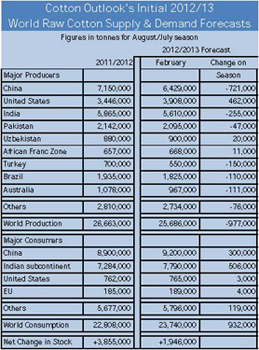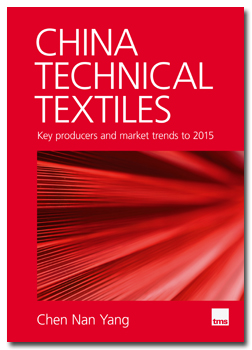ROSEVILLE, Minn. — January 30, 2012 — The Industrial Fabrics Foundation (IFF) today announced that
it is offering five scholarships to specialty fabrics/technical textile industry students.
But these are only for students with dreams as wide as a fabric structure sports stadium,
high as a cover on a NASA missile about to blast into space; deep as a dam embankment fortified
with geosynthetics, tiny as a fabric patch in a heart valve, cool as a sustainable design shade
structure, hot as a temperature controlled climate suit for arctic workers, strong as a fabric
reinforced ski worn by an Olympic athlete.
The importance of college and vocational training has been the core of IFF’s mission, and a
hot button news story this past week in President Obama’s State of the Union address and in his
speech Friday at the University of Michigan. The country’s new goal: Getting people the education
and training they need so they’re ready to take on the jobs of today and tomorrow.
Technical training is a critical part of the specialty fabrics/technical textiles industry
for everyone from the chemist conducting R&D to the factory worker operating million-dollar
high-tech machinery.
The specialty fabrics industry is made up of a wide spectrum of companies. Small, medium and
large suppliers make fabrics, machinery, components and accessories.
End product manufacturers make high-performance textile products for a variety of uses
by the aerospace industry, the military, first responders/hazmat, fabric structures, biomedical
applications, high performance sports apparel, geosynthetics in agriculture and waste containment;
automotive interiors; and in futuristic applications in nanotechnology.
The world market for these high-performance fabrics was estimated at $126 billion in 2011 —
$29 billion of that in the U.S. In fact, this is one segment of the domestic textile manufacturing
base which now thrives thanks to continuous technical innovation.
IFF was established in 1994, and it awards several scholarships each year to students
enrolled in accredited colleges, universities or technical schools. The foundation was set up by
the board of directors of the Industrial Fabrics Association International (IFAI), a trade
group with over 1,800 member companies which has represented the U.S. specialty fabrics industry
for 100 years.
Students interested in applying for the scholarships can visit IFF’s website — the submission
deadline is in May — and the scholarship applies to the following school year, paid directly to the
students’ schools for fall semester tuition.
The IFF Board of Directors holds responsibility for application review and scholarship
awards. Announcement to the industry of the scholarship recipients takes place during IFAI Expo
Americas 2012, which will be held Nov. 7-9 at the Boston Convention Center.
The scholarships offered are as follows:
Don Williams IFF Student Scholarship — $3,000 each (up to three available) — This
scholarship is named in honor of the IFF board director who was instrumental in developing the
foundation scholarship program. IFF pays for tuition expenses at an accredited college, university,
or technical school textile or textile-related program. Applicants must be enrolled in a textile or
textile-related program of study. Recipients are selected on the basis of academic achievement,
community service, and interest in a future career in the specialty fabrics industry.
IFAI Member Scholarship — $3,000 each (up to two available) — This scholarship award
pays for tuition expenses at an accredited college, university or technical school. Recipients are
selected on the basis of academic achievement, community service, and interest in a future career
in the specialty fabrics industry.To qualify for the IFAI Member Scholarship award, applicants must
be employed by or related to an employee of an IFAI member company.
In addition to these IFF-funded scholarships, several market segment scholarships are made
available through IFF by IFAI Divisions:
Architect Student Scholarship — $3,000 (one available) — This scholarship award pays
for tuition expenses at an accredited college or university architect program.The scholarship
recipient will be selected on the basis of academic achievement, community service, and
interest in a future career in the specialty fabrics industry. To qualify for the scholarship,
applicants must be enrolled in a college or university architect program. This scholarship is
funded by a donation from the Fabric Structures Association (FSA), a division of IFAI.
Fabric Graphics Association (FGA) Member Scholarship — $2,000 (one available) — This
scholarship award provides tuition expenses at an accredited college, university or technical
school. The scholarship recipient will be selected on the basis of academic achievement, community
service, and interest in a future career in the fabric graphics industry.T o qualify for the FGA
Member Scholarship award, applicants must be employed by or related to an employee of a FGA member
company. This scholarship is funded by a donation from the Fabric Graphics Association (FGA), a
division of IFAI.
Marine Fabricators Association (MFA) Member Scholarship — $2,000 (one available) —
This scholarship award provides tuition expenses at an accredited college, university or technical
school.The scholarship recipient will be selected on the basis of academic achievement, community
service, and interest in a future career in the specialty fabrics industry. To qualify for the MFA
Member Scholarship award, applicants must be employed by or related to an employee of an MFA member
company. This scholarship is funded by a donation from the Marine Fabricators Association (MFA), a
division of IFAI.
Additional scholarships will be announced in February and March, 2012. For more information
visit www.ifai.com/resources/iff or contact Ruth Stephens, IFF Managing Director, at +1 651
225 6545, rastephens@ifai.com.
Posted on February 21, 2012
Source: IFAI











